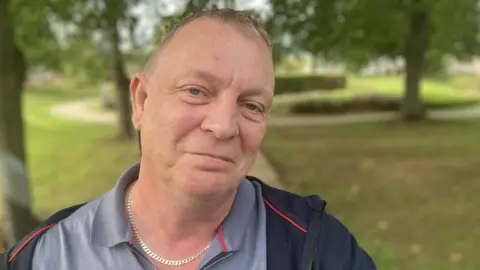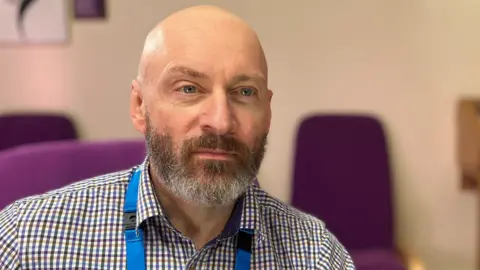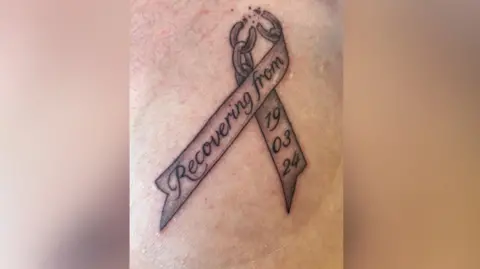Rob SissonsEast Midlands health correspondent
 BBC
BBC
John Wade gave up a 46-year gambling addiction after seeking help from a new NHS service
“It was a seaside holiday at Largs in Scotland, the one-armed bandit fruit machine was broken and the coins poured out.”
Former gambling addict John Wade can trace the origins of his addiction back more than four decades to being drawn in to playing a fruit machine on holiday.
John says most children would keep the cash and “head to the nearest sweet shop”, but he felt compelled to put all the money back into the slot machine next to it and “promptly lost the lot”.
The 54-year-old, from Thurmaston in Leicestershire, says his “progressive addiction” saw him gambling for 46 years.
“It culminated in me gambling on anything and everything. It was casinos, bingo, horse racing, football, it did not matter what,” he says.
Now John, who describes himself as a “recovering compulsive liar”, is encouraging others to seek help like he eventually did from a new NHS service.
“When you have a gambling addiction, your circle of friends goes so small. They can walk away, but you can’t walk away from yourself.
“I ended up loathing my addiction and myself and became suicidal,” he says.
‘I lived in chaos’
John says his addiction harmed his relationship with his three children and contributed to the break-up of two marriages.
“It took me years to seek help.
“For so long I lived in chaos. There was the deceit, the lies, the manipulation of friends to lend money for my addiction. All I really thought about was gambling,” he says.
Even as a teenager in the 1980s, John remembers changing out of his school uniform to go to the bookmakers at lunchtime, using his dinner money to bet.
Then with the later advent of mobile phones, he says “everything in my life was gambling-related”.
“As soon as I woke up in the morning, I’d pick up my phone to check to see if I’d won or lost the night before,” he says.
Eventually after depression and suicidal thoughts, John turned to his GP in March 2024 for help and was referred to the newly established NHS East Midlands Gambling Harms Service.
He says this was a “massive step” where he took part in group therapy sessions with other gamblers and one-to-one sessions with psychologists.
“I was buzzing. This was my fresh start and they really helped me to understand why I did this stupid thing so often,” he says.
“They helped me understand why I gambled and the triggers.
“If I had money on pay day, I’d want to gamble with it. If I lost money I’d want to gamble more to recover it – it was a vicious circle.”

Dorian Carr, specialist cognitive and behavioural psychotherapist, hopes other people will be inspired to get help after reading John’s story
John says the eight-week course with the NHS service dramatically improved his life, ended his suicidal thoughts and helped him develop stronger relationships.
The service set up in 2023, run by Derbyshire Healthcare NHS Foundation Trust, accepts self-referrals as well as ones from GPs.
Dorian Carr, senior cognitive and behavioural psychotherapist with the trust, said there was no definitive reason why some people struggled more with gambling than others.
“For some, it is an escape from reality, it can be about an illusion of control,” he says.
He adds there are many thousands of people in the East Midlands who “could probably benefit from support because of the harms gambling has caused”.
 John Wade
John Wade
John has a tattoo of the date he sought help below his heart as he says the day “changed his life”
The service has seen an increasing number of people seeking help.
Latest figures show it had 373 referrals from April to October 2025 (28% were women) – compared to 288 during the same period in 2024 (13% were women).
Dorian added: “John is so brave to tell his story to help others.
“He says ‘if by speaking out and telling my story encourages one person to seek help, it will have been worth it’.”
John says he now “makes every day count” and has 19 March 2024 tattooed on his body – the date he sought help, the last day he placed a bet and the day “his life changed”.
If you have been affected by the contents of the article, support is available through the BBC Action Line

